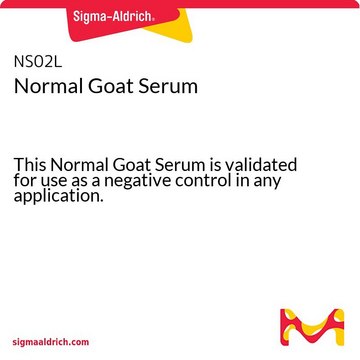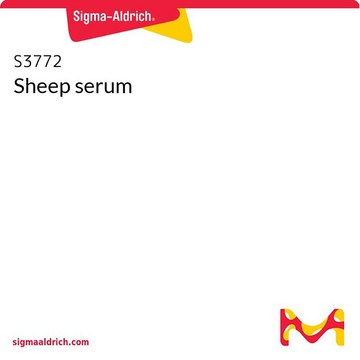Wszystkie zdjęcia(1)
Kluczowe dokumenty
About This Item
Kod UNSPSC:
12352203
NACRES:
NA.46
Polecane produkty
pochodzenie biologiczne
donkey
Poziom jakości
sterylność
non-sterile
zawiera
preservative
Zastosowanie
research pathology
Warunki transportu
dry ice
temp. przechowywania
−20°C
Szukasz podobnych produktów? Odwiedź Przewodnik dotyczący porównywania produktów
Opis ogólny
Donkey serum is pooled from a normal donor herd. In immunoassays, normal donkey serum can serve as a blocking agent and a control. It is used as a blocking agent in various studies for immunohistochemistry and immunocytochemistry, ranging from 5% to 20%.
Zastosowanie
Donkey serum has been used:
- as a component in blocking buffer for immunofluorescence
- in phosphate buffer saline (PBS) as a blocking agent
- as a blocking agent in frozen immunocytochemistry and immunohistochemistry
- to prevent nonspecific binding in parvalbumin immunohistochemistry
Oświadczenie o zrzeczeniu się odpowiedzialności
Unless otherwise stated in our catalog or other company documentation accompanying the product(s), our products are intended for research use only and are not to be used for any other purpose, which includes but is not limited to, unauthorized commercial uses, in vitro diagnostic uses, ex vivo or in vivo therapeutic uses or any type of consumption or application to humans or animals.
Ta strona może zawierać tekst przetłumaczony maszynowo.
produkt powiązany
Numer produktu
Opis
Cennik
Hasło ostrzegawcze
Warning
Zwroty wskazujące rodzaj zagrożenia
Zwroty wskazujące środki ostrożności
Klasyfikacja zagrożeń
Aquatic Chronic 2 - Eye Irrit. 2 - Skin Irrit. 2 - Skin Sens. 1
Kod klasy składowania
12 - Non Combustible Liquids
Klasa zagrożenia wodnego (WGK)
WGK 3
Temperatura zapłonu (°F)
Not applicable
Temperatura zapłonu (°C)
Not applicable
Wybierz jedną z najnowszych wersji:
Masz już ten produkt?
Dokumenty związane z niedawno zakupionymi produktami zostały zamieszczone w Bibliotece dokumentów.
Klienci oglądali również te produkty
Yasmin Fardghassemi et al.
Disease models & mechanisms, 10(12), 1465-1480 (2017-10-25)
Polyglutamine expansion diseases are a group of hereditary neurodegenerative disorders that develop when a CAG repeat in the causative genes is unstably expanded above a certain threshold. The expansion of trinucleotide CAG repeats causes hereditary adult-onset neurodegenerative disorders, such as
Helen F Irving-Rodgers et al.
Biology of reproduction, 69(6), 2022-2028 (2003-08-22)
Bovine ovarian antral follicles exhibit either one or the other of two patterns of granulosa cell death in atresia. Death can commence either from the antrum and progress toward the basal lamina (antral atresia) or the converse (basal atresia). In
H F Irving-Rodgers et al.
Molecular reproduction and development, 73(10), 1292-1302 (2006-07-26)
Using immunohistochemistry and RNA analyses we examined the fate of components of a newly identified matrix that develops between granulosa cells (focimatrix, abbreviated from focal intraepithelial matrix) and of the follicular basal lamina in ovulating bovine ovarian follicles. Pre- and
Omid Ahmadi et al.
Journal of gastroenterology and hepatology, 25(2), 277-285 (2009-10-02)
Interstitial cells of Cajal (ICC) are distributed with smooth muscle throughout the gastrointestinal tract and are involved in regulating motility. ICC were recently discovered in the wall of the human gallbladder. This study sought to determine whether ICC are present
Marianne O Larsen et al.
American journal of physiology. Endocrinology and metabolism, 282(6), E1342-E1351 (2002-05-15)
Nonrodent models of diabetes are needed for practical and physiological reasons. Induction of mild insulin-deficient diabetes was investigated in male Göttingen minipigs by use of streptozotocin (STZ) alone (75, 100, and 125 mg/kg) or 125 mg/kg combined with pretreatment with
Nasz zespół naukowców ma doświadczenie we wszystkich obszarach badań, w tym w naukach przyrodniczych, materiałoznawstwie, syntezie chemicznej, chromatografii, analityce i wielu innych dziedzinach.
Skontaktuj się z zespołem ds. pomocy technicznej












